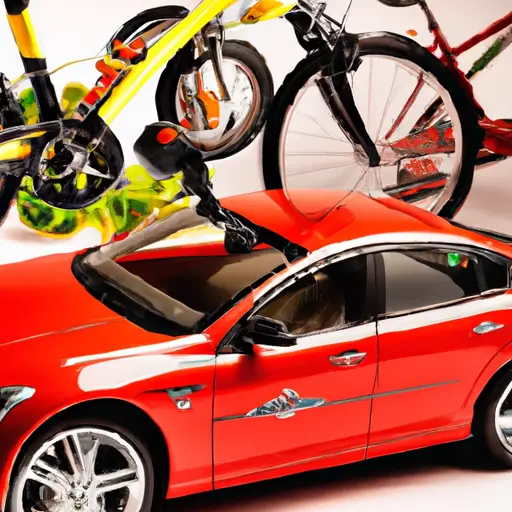So, have you ever wondered whether it’s better to buy a brand new car or go for a used one? I mean, we all love that new car smell and the shiny exterior, but is it really worth the extra cost? Let’s take a closer look at the pros and cons of buying a new car.
Well, first things first, one major advantage of buying a brand new car is that you get that peace of mind knowing that you’re the first owner. No hidden history or potential issues to worry about. Plus, new cars usually come with the latest features and technology, which can be pretty cool. On the flip side, though, the biggest drawback of buying new is the depreciation. As soon as you drive it off the lot, the value of your car drops significantly. It’s like a punch to the gut when you realize you’ve lost a chunk of money in a matter of minutes. But hey, if you’re looking for that new car experience and don’t mind the hit to your wallet, it might still be worth it for you. If you want to dive deeper into this topic, keep reading because there’s a lot more to consider!

Pros of Buying a New Car
Warranty Coverage
When buying a new car, one of the biggest advantages is the warranty coverage that comes with it. Most manufacturers offer warranties that cover the car for a certain number of years or miles, providing peace of mind and protection against unexpected repair costs.
Reliability and Peace of Mind
New cars offer a higher level of reliability compared to used cars. They haven’t been driven extensively and are less likely to have mechanical issues or need major repairs. This can give buyers peace of mind knowing that their car is in good working condition.
Latest Technology and Features
Buying a new car allows you to enjoy the latest advancements in technology and features. From advanced safety features to state-of-the-art infotainment systems, new cars often come equipped with the latest innovations that enhance your driving experience.
Customization Options
When buying a new car, you have the opportunity to choose the exact model, color, and features that suit your preferences. Whether you want a specific paint color or prefer advanced features like a touchscreen display, buying new allows you to customize the car to your liking.
Improved Fuel Efficiency
Newer cars are designed with improved fuel efficiency in mind. Automakers are constantly developing new technologies to enhance fuel efficiency, resulting in lower fuel consumption and reduced emissions. This can save you money on fuel costs in the long run.
Better Financing Options
Financing a new car often comes with more favorable terms compared to used cars. Dealerships and lenders often provide lower interest rates and longer repayment periods for new car loans. This can make buying a new car a more affordable option for those on a tight budget.
Cons of Buying a New Car
Higher Purchase Price
One of the downsides of buying a new car is the higher purchase price compared to used cars. New cars come with a premium price tag due to their brand-new condition and the latest features they offer.
Depreciation
New cars experience rapid depreciation as soon as they are driven off the lot. Within the first few years of ownership, a new car can lose a significant portion of its value. This depreciation can make it challenging to recoup the initial investment if you decide to sell the car in the future.
Higher Insurance Costs
Insuring a new car can be more expensive compared to insuring a used car. New cars are typically more valuable, making them more expensive to repair or replace in the event of an accident. This higher value often translates to higher insurance premiums.
Limited Choices in Inventory
When buying a new car, your choices may be limited to the inventory available at dealerships. If you have a specific make, model, or color in mind, you may have to wait for the dealership to order it or opt for a different choice. This limited inventory can limit your options.
Higher Taxes and Fees
New cars often come with higher taxes and fees compared to used cars. The initial registration fees, sales taxes, and other related costs can add significant amounts to the overall purchase price of a new car.
Risk of Early Model Year Issues
New car models often undergo changes and updates from year to year. Being an early adopter of a new model can come with the risk of encountering unforeseen issues or malfunctions that haven’t been fully addressed by the manufacturer. It’s important to consider this potential risk before buying a brand-new car.
Pros of Buying a Used Car
Lower Purchase Price
One of the main advantages of buying a used car is the lower purchase price compared to new cars. Used cars have already experienced depreciation, allowing buyers to get more value for their money.
Less Depreciation
Used cars have already gone through the initial depreciation period, meaning they won’t lose their value as rapidly as new cars. The rate of depreciation tends to be lower for used cars, making them a more cost-effective option in the long run.
Lower Insurance Costs
Insuring a used car is generally more affordable compared to insuring a new car. Used cars are typically valued lower, resulting in lower insurance premiums. This can help save money on overall insurance costs.
Wider Choices in Inventory
When buying a used car, you have a wider range of choices available in terms of make, model, and features. You can explore different years, trim levels, and even find discontinued models that may suit your preferences better.
Lower Taxes and Fees
Used cars often come with lower taxes and fees compared to new cars. The initial registration fees and sales taxes are generally based on the value of the car, so a lower-priced used car will result in lower taxes and fees.
Past Performance and Reliability
By researching the history of a used car, you can get insights into its performance and reliability. Reading reviews and checking the vehicle’s maintenance records can give you an idea of how well the car has performed in the past, helping you make an informed decision.
Cons of Buying a Used Car
Higher Maintenance and Repair Costs
Used cars may require more frequent maintenance and repairs compared to new cars. As the car gets older and accumulates more miles, parts may start to wear out, leading to higher maintenance and repair costs.
Possibility of Hidden Problems
When buying a used car, there is always the risk of encountering hidden problems or undisclosed issues. Some sellers may not fully disclose the car’s history, making it important to thoroughly inspect the vehicle and, if possible, have it inspected by a mechanic before making a purchase.
Lack of Warranty Coverage
Used cars usually don’t come with the same level of warranty coverage as new cars. If a used car experiences any issues or breakdowns, the repairs may have to be covered out of pocket, increasing the overall cost of ownership.
Outdated Technology and Features
Used cars often lack the latest technology and features found in newer models. While this may not be a concern for everyone, those who prioritize having the latest infotainment systems or advanced safety features may be better off buying a new car.
Potential Financing Challenges
Obtaining financing for a used car can sometimes be more challenging compared to new cars. Some lenders may have stricter requirements for used car loans, making it harder for buyers to secure favorable financing terms.
Limited Customization Options
When buying a used car, you are limited to the features and options that came with the specific model you choose. If you have specific customization preferences, a used car may not offer the same level of flexibility as a new car.

Factors to Consider before Buying
Budget and Affordability
Before buying a car, it’s crucial to assess your budget and determine how much you can comfortably afford. Consider not just the purchase price, but also the ongoing costs of owning and maintaining the vehicle.
Vehicle History and Condition
When buying a used car, it’s essential to research the vehicle’s history and inspect its condition thoroughly. Request a vehicle history report and consider having a trusted mechanic inspect the car to identify any potential issues.
Intended Use and Mileage
Consider how you plan to use the car and the expected mileage. If you have a lengthy commute or frequently travel long distances, a more fuel-efficient car may be a better choice. Evaluate your driving habits and choose a car that suits your needs.
Resale Value
While it may not be a concern if you plan to keep the car for a long time, considering the resale value can be important if you anticipate selling the car in the future. Some car models retain their value better than others, which can affect your overall ownership costs.
Availability of Financing
Before deciding on a car, explore the availability of financing options and compare interest rates and loan terms. This will help you determine the affordability of the car and ensure you secure the best financing option.
Personal Preference and Taste
Consider your personal preferences and taste when choosing a car. Whether it’s the vehicle type, style, or brand reputation, ensure that the car aligns with your preferences and suits your lifestyle.
Additional Costs to Consider
Maintenance and Repairs
Cars require routine maintenance and occasional repairs, so it’s vital to budget for these costs. Consider factors such as scheduled maintenance, tire replacements, and unexpected repairs that may arise.
Fuel and Insurance
Factor in the cost of fuel and insurance when budgeting for a car. Fuel prices can vary depending on the car’s fuel efficiency and the current cost of fuel in your area. Insurance premiums will vary based on factors such as your driving history, location, and the car’s make and model.
Taxes and Registration Fees
Be aware of the taxes and registration fees associated with purchasing a car. These costs can vary depending on the state or country you reside in and the value of the car.
Parking and Storage
Consider the cost of parking and storage for your car. If you live in a city or urban area, parking fees can add up, especially if you require secure or covered parking. If you don’t have a garage or dedicated parking space, you may need to factor in the cost of renting a storage space.
Upgrades and Accessories
Factor in any upgrades or accessories you may want to add to your car. Whether it’s a set of premium floor mats or a rooftop cargo carrier, these additional expenses can add up.
Financing Interest
When financing a car, take into account the interest charges over the duration of the loan. Even a small difference in interest rates can significantly impact the overall cost of the car.

Research and Comparison
Researching Vehicle Options
Take the time to research and compare different vehicle options before making a decision. Consider factors such as reliability, safety ratings, fuel efficiency, and resale value for each model you’re interested in.
Comparing Prices and Features
Compare prices and features of different cars to find the best value for your money. Consider whether the extra features and options are worth the additional cost.
Reading Reviews and Ratings
Read reviews and ratings from reputable sources to get a better understanding of the car’s performance, reliability, and user satisfaction. Reviews from current owners can provide valuable insights into the pros and cons of owning a particular car.
Considering Expert Opinions
Consider the opinions of automotive experts and industry professionals when making a decision. Their expertise and experience can provide valuable insights into the overall quality and performance of different cars.
Seeking Advice from Trusted Sources
Talk to friends, family, and trusted individuals who have experience buying cars. They can offer personal insights and recommendations based on their own experiences.
Test Driving and Inspection
Always test drive a car before making a purchase. This will give you a feel for the car’s performance, handling, and features. Additionally, it’s important to thoroughly inspect the car, both visually and mechanically, to ensure it’s in good condition.
Seeking Professional Help
Consulting with Car Dealerships
Consulting with car dealerships can provide valuable information about different car models, pricing, and financing options. Dealerships can often provide guidance and assistance throughout the buying process.
Getting Assistance from Automotive Experts
Automotive experts, such as car journalists or industry professionals, can provide valuable advice and guidance based on their expertise. They can help you navigate the complexities of the car-buying process and ensure you make an informed decision.
Engaging with Auto Inspectors
Consider engaging with auto inspectors who can thoroughly inspect the car before you make a purchase. They can identify any potential issues or hidden problems that may not be visible to the untrained eye.
Consulting with Mechanics
If you have specific concerns about a car’s mechanical condition, consider consulting with a trusted mechanic. They can provide insights into the reliability and potential maintenance challenges associated with a particular car model.
Working with Financial Advisors
If you require assistance with financing or have specific financial concerns, consider working with a financial advisor who can help assess your budget and guide you through the financing process.
Seeking Legal Advice if Necessary
If you encounter any legal complexities or have specific legal concerns during the car-buying process, consider seeking advice from a lawyer who specializes in automotive law. They can help ensure you navigate any legal challenges properly.

Considering Other Ownership Options
Leasing a Car
Leasing a car offers the flexibility of driving a new car without the long-term commitment of ownership. It allows you to enjoy the latest features and technology, but you won’t own the car at the end of the lease term.
Car Subscription Services
Car subscription services offer a flexible alternative to traditional car ownership. With a subscription, you pay a monthly fee that covers vehicle usage, insurance, and maintenance. This option is ideal for those who prefer to switch vehicles frequently or don’t want the responsibilities of ownership.
Car Sharing Programs
Car sharing programs provide access to a car when you need it without the commitment of ownership. Instead of owning a car, you can rent one for a specific duration or on an as-needed basis. Car sharing programs are ideal for those who don’t require a car for everyday use.
Renting a Car
Renting a car is a short-term solution for those who need a vehicle for a limited period. This is a convenient option for vacations, business trips, or when your regular car is undergoing maintenance or repair.
Carpooling and Ride-Sharing
Consider carpooling or ride-sharing as an alternative to owning a car. Sharing rides with others can save money on fuel and parking costs while reducing your carbon footprint.
Using Public Transportation
For individuals living in urban areas with excellent public transportation systems, relying on public transport can be a cost-effective and environmentally friendly alternative to owning a car.
Environmental Impact
Emission Levels of New Cars
New cars are subject to more stringent emissions standards, which can reduce their environmental impact. Modern car engines are designed to emit fewer pollutants and greenhouse gases, helping to reduce air pollution and combat climate change.
Impact of Manufacturing Processes
The manufacturing of cars, both new and used, has an environmental impact. The production of cars consumes natural resources and generates emissions. However, newer car manufacturing processes have become more environmentally conscious, utilizing sustainable practices when possible.
Effect on Natural Resources
The production and operation of cars have an impact on natural resources. From the extraction of raw materials to the energy required to power the vehicles, cars contribute to the use of finite resources such as metal ores, petroleum, and electricity.
Potential for Recycling and Reuse
Cars, both new and used, have the potential to be recycled and reused at the end of their lifespan. Recycling car parts and materials reduces waste and conserves resources. Additionally, some car manufacturers are designing vehicles with a focus on recyclability and sustainability.
Alternative Fuel Options
New cars often come with alternative fuel options such as hybrid, plug-in hybrid, and electric models. These vehicles offer reduced emissions and can help mitigate the environmental impact of traditional gasoline-powered cars.
Promoting Sustainable Transportation
By considering alternative transportation methods and opting for more fuel-efficient cars, individuals can contribute to promoting sustainable transportation practices. Carpooling, using public transportation, or choosing eco-friendly vehicles are steps towards reducing environmental impact.

Long-Term Financial Considerations
Cost of Ownership and Operation
Consider the long-term cost of owning and operating a car. This includes fuel costs, maintenance and repair expenses, insurance premiums, and other associated costs. Calculating the total cost of ownership can help you make an informed decision about which car is the most cost-effective.
Resale Value and Depreciation
As mentioned earlier, new cars experience rapid depreciation, while used cars tend to have a slower rate of depreciation. Considering the resale value of a car can help you estimate its long-term value and the potential return on your investment.
Longevity and Durability
Taking into account a car’s longevity and durability is essential for long-term financial planning. Some car models have a reputation for lasting longer and requiring fewer repairs, leading to lower overall ownership costs.
Lifetime Fuel and Maintenance Costs
Estimating the lifetime fuel and maintenance costs of a car can help you determine its long-term financial impact. Fuel-efficient cars and those with lower maintenance requirements can save you money in the long run.
Financing Terms and Interest Rates
When financing a car purchase, consider the terms and interest rates associated with the loan. Higher interest rates over an extended loan term can increase the overall cost of the car and impact your financial situation.
Future Market Trends and Demand
Anticipating future market trends and demand can affect the long-term financial considerations of buying a car. Some car models hold their value better than others, and knowing which cars are in high demand can help you make a more profitable decision in the future.
Personal Preference and Lifestyle Factors
Desired Vehicle Type and Style
Consider your desired vehicle type and style when buying a car. Whether you prefer a sedan, SUV, or sports car, choose a vehicle that aligns with your lifestyle and meets your needs.
Functional Requirements and Space Needs
Evaluate your functional requirements and space needs when choosing a car. If you have a growing family or frequently transport large items, prioritize cars with ample cargo space and passenger capacity.
Safety Features and Ratings
Prioritize safety features and consider the safety ratings of different car models. Advanced safety features such as automatic emergency braking, lane-keeping assist, and adaptive cruise control can provide added peace of mind.
Brand Reputation and Loyalty
For some buyers, brand reputation and loyalty play a significant role in their decision-making process. Consider a brand’s reliability, customer satisfaction, and overall reputation when choosing a car.
Performance and Driving Experience
If you have a preference for a certain level of performance or enjoy a particular driving experience, factor this into your decision-making process. Some cars offer sportier handling and more powerful engines, while others prioritize comfort and fuel efficiency.
Value for Money
Ultimately, consider the value for money that a car offers. Evaluate the cost of ownership, features, and overall quality of the vehicle to ensure you’re getting the best value within your budget.
Conclusion
As I have outlined, the decision to buy a new or used car comes with its own set of pros and cons. It’s essential to evaluate your priorities and preferences, weigh the pros and cons carefully, and consider your financial situation before making a decision. Additionally, assessing your long-term needs, researching and comparing different car options, and seeking professional help when necessary can help ensure a successful car buying experience. Remember to consider additional costs, environmental impact, and the personal preference and lifestyle factors that are important to you. By carefully considering these factors, I am confident you’ll be able to make an informed decision that aligns with your needs, preferences, and financial situation.
